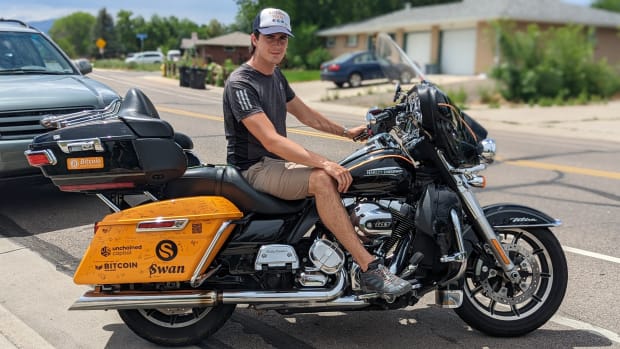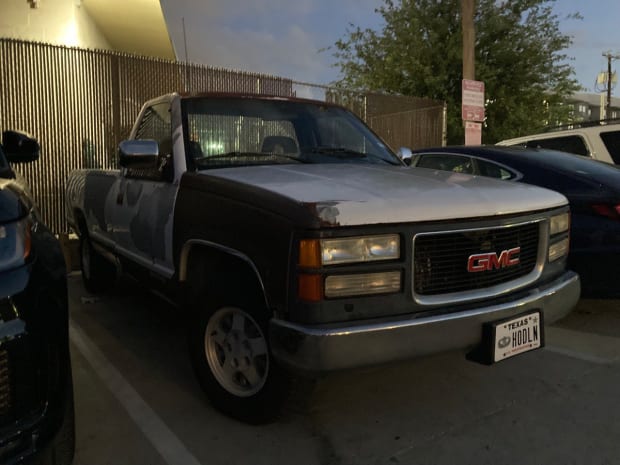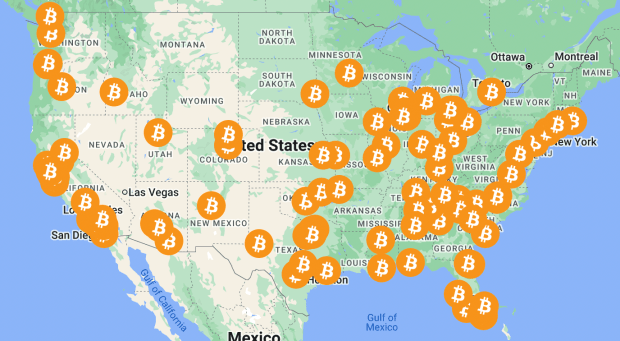Journeying across the United States and visiting various Bitcoin meetups showed certain aspects of Bitcoin culture are consistent regardless of location.
Over the last 10 weeks, I traveled over 8,000 miles of the United States by motorcycle, visiting 25 Bitcoin meetups in Texas, the South and the Midwest. I am not done yet, but I wanted to share a few of my thoughts while the memories are still fresh, so you and your friends and family can understand what I am learning about the culture developing around Bitcoin. If you want to follow my journey or donate, go here. If you want your friends and family to get a look into the Bitcoin world, share this article with them.

One of my motivations behind this tour was to establish relationships with Bitcoiners in person. The internet is a useful and powerful tool, but in some ways, I believe it stunts our ability to connect with others. The web — in its current form — also created fertile ground for centralized entities to scoop up attention and redirect it, all under the guise of decentralization. The simple way to combat this centralizing force? Put down the phone and talk to people in person. So that’s what I set out to do.
To help me on my journey, I reached out to companies in the Bitcoin space and pitched them on being involved in this exploration of the Bitcoin world. Swan Bitcoin, a tool for making regular purchases of bitcoin, was the first to jump on board and offer financial help as well as production support to create a documentary series of the tour (still on its way). Then Unchained Capital, a bitcoin financial services company offering multisig vaults and IRAs among other products, signed up to lend financial support and connections especially within Texas. Bitcoin Magazine is giving me a ton of media support through their channels, and Upstream Data pitched in to help pay for fuel as I cover 10,000 miles on my motorcycle. In return, these sponsors earned a logo on my orange saddlebags and mentions throughout the tour. The route, meetups visited and focus of conversation along the tour are entirely my own decisions.
Before I dive into what I am seeing on the road, it’s important for me to make the distinction between Bitcoin and other projects which claim to be cryptocurrencies like Bitcoin. On my tour, I am visiting meetups that focus only on Bitcoin, not other cryptocurrencies. While these are often lumped together, I have found that the characteristics of cryptocurrency enthusiasts could not be more different from those who are solely interested in Bitcoin. The reasons for this separation are out of scope for this article, but if you’re interested in why Bitcoin is different from everything else, this is a great read.
Here are a few trends I am seeing as I cross the U.S. visiting Bitcoin meetups.
Bitcoin Is A Lifeboat, Not A Lottery Ticket
Many outsiders to the Bitcoin community think of bitcoin as a lottery ticket, bought by proponents in the hopes of getting rich quickly. However, my experience meeting Bitcoiners across the U.S. shows me that nothing could be further from the truth.
It is increasingly clear that our society is facing myriad problems: prices are rising out of control, asset values are shrinking, governments are limiting freedoms in the name of collective safety and tempers often boil over. Younger generations feel a despondency about the prospect of buying a home, raising a family and building a better future. Any way you cut it and no matter your side of the political aisle, hope is hard to come by.
Through my journey across the U.S., I see that Bitcoiners are one of the few groups with hope. This stems from the fact that they recognize many of these problems as having roots in our monetary system — a system controlled by people and thus influenced by politics. The clear and fixed rules of Bitcoin’s monetary system eliminate this central control, and therefore could help clear up many of the seemingly intractable problems we face today. An investment in Bitcoin means jumping off the sinking ship of increasingly centrally controlled currencies and economies into a new, fairer system.
Bitcoiners are primarily savers, not gamblers — they are using tools like Swan Bitcoin to regularly buy small amounts of bitcoin because they see it as a lifeboat, not a lottery ticket.
You might expect from the way the media has portrayed Bitcoin that I see Rolls-Royces and designer clothes at Bitcoin meetups — in fact, I’ve seen the exact opposite. I find thrifty people who save money before they spend it, who drive older cars because they still run and can find no reason to buy a flashy, expensive one — even if they have the money and income to support it.

A focus on saving for the long term rather than getting rich quickly extends to the topics of discussion at meetups. The price of bitcoin in dollars is rarely discussed, and nobody is talking about what they’ll do if bitcoin goes to a million bucks. Attention is paid to the fundamentals of the Bitcoin network, like its stable monetary policy and ability to keep processing blocks of transactions — which remain unaffected through price swings. Beyond Bitcoin, I find discussion is focused on how to best build a fulfilling life, from nutritious food to sustainable businesses and strong relationships in a community.
One straightforward marking of the disconnection between the bitcoin price and enthusiasm of the Bitcoin community is attendance at meetups. As I’ve traveled across the U.S. to 25 Bitcoin meetups to date, meetup organizers are consistently telling me that turnouts are stable if not increasing over the past six months, all while the bitcoin price has steadily dived in dollar terms.
Bitcoin Is A Decentralized Movement
The first stop on my tour was Texas. There is a ton of activity in the state around Bitcoin and some of the biggest meetups in the country (and possibly the world) are in Austin and Houston. Austin is home to Bitcoiners of all stripes and capabilities, and it hosts one of the biggest Bitdevs technical meetups in the Bitcoin space. Houston brings together Bitcoiners and the energy community to discuss bitcoin mining in particular.
That said, Bitcoin is not a centralized movement springing out of Texas — my own experiences on this tour have made that clear.
Revitalizing The “Flyover States”
Unlike just about every other technological or business movement within the U.S., I am finding the most enthusiasm for Bitcoin can be found outside of the major metros, within small cities all around the U.S. Many of these cities — like Columbus and Milwaukee — felt the offshoring of manufacturing and the brain drain of talent to nearby major metro areas over the past 50 years.
To the participants at Bitcoin meetups in these cities, Bitcoin presents an opportunity to once again level the playing field for small businesses, communities and cities. In our existing politicized financial and monetary system, large corporations can lobby for contracts and bailouts funded by the money printer.
Bitcoin’s immunity to political forces means bigger does not always mean better. The Wall Street bank has no more permissions on the Bitcoin network than the small business on Turtle Lake, Wisconsin, running their own Bitcoin node on a laptop. This leveling of the playing field could drive a sharing of industry and wealth to more communities spread across the world.
Cambrian Explosion In Educational Materials
I am witnessing incredible inventiveness and generosity from Bitcoiners when it comes to educational materials. At a recent meetup in Denver, someone brought a box filled with copies of “Economics in One Lesson,” a foundational economics text that breaks down many of the fallacies employed in modern economic theory. I see many meetup participants customizing open-sourced pamphlets explaining Bitcoin to small businesses and sharing them in their communities.
The organizers of the Bitcoin meetup in Charlotte, North Carolina, regularly put together speaking events and book clubs to help people learn more about Bitcoin and its impact on our economy and society. Houston’s monthly Bitcoin meetup focuses on educating energy producers on how Bitcoin can improve the efficiency of their operations, thus helping all of society.
Bitcoin Makes People Stronger
One of my favorite parts about taking a long-term road trip across the U.S. is the late night wandering conversations I find myself in with new friends.
While discussing how Bitcoin impacted us both, a Bitcoiner who goes by @HodlRev on Twitter put it well: There is a mindset of independence that comes from deeply investigating Bitcoin. This does not mean venturing off into the woods to live alone, depending on nobody. What it means is to believe that you can depend on yourself and your own abilities to achieve anything you need to.
We were having this conversation while sitting on a ranch that proves the power of this belief: A couple who grew up in cities and had no experience with farming built a large flock of sheep, chickens, rabbits and an entire food forest in just four years. This attitude of independence stands in stark opposition to the “learned helplessness” which our modern society seems to cultivate and even prize through memes like young people clapping themselves on the back for “adulting.”
Options Make Independence
Bitcoin enables independence not by forcing us into any lifestyle but by providing options. The clearest example of this comes from the options for holding bitcoin. You can optimize for convenience by keeping bitcoin with a centralized entity like Cash App; you can optimize for security by holding your bitcoin yourself via open-source wallet software; and you can get a bit of both with tools like Unchained Capital’s vaults. The traditional system gives you fewer choices when it comes to security and virtually no choice when it comes to monetary inflation.
However, with these choices comes personal responsibility to evaluate your options and select the best ones for your situation. The act of investigating and choosing takes effort but builds knowledge and self-sufficiency. That makes individuals stronger, which makes families, communities, and the world at large stronger.
Independence Through Homesteading
Throughout my tour, I am also struck by the great interest Bitcoiners take in homesteading and gardening. From the ranch run by HodlRev in Michigan to the Beef Initiative conference I stopped at in Texas to Brandon Quittem’s home garden in Minnesota, Bitcoiners are interested in finding sources of nutrition closer to home.
Bitcoin Must Be Relatable
If you are reading this and still not understanding what the hell us Bitcoiners are on about, know that understanding Bitcoin takes time. Very few people understand why any of this matters overnight, and those who do usually had a number of prior experiences that pointed them in the right direction.
Through talking to many people across the U.S. over the past 10 weeks, I’ve learned that, like anything, understanding Bitcoin comes when it is directly related to immediate problems in one’s own life.
Michael Atwood of Oshi App helped me understand that merchants face high costs just to accept credit card payments, and accepting bitcoin can help them cut that down significantly while also attracting a new group of customers. A Bitcoiner who goes by @elderndiablito on Twitter visits his local farmers market every Sunday to talk to merchants about this problem and help them understand Bitcoin, and he knows it takes more than one conversation to get them ready to accept bitcoin payments.
For some, a simple way to relate to Bitcoin is through bitcoin mining. If you have access to cheap power, say below six cents per kilowatt hour, mining bitcoin can provide you an income stream much like owning a rental property. However, this rental property has low to no maintenance costs, no tenants and it can fit on a shelf in your garage. In states with cheap energy — like Indiana — I found many people at the local Bitcoin meetup were mining at home. Tinkering with a miner can be a fun way to learn more about Bitcoin and collect a little income along the way.
Go Forth And Learn
I hope this article gave you a sense for what Bitcoin actually engenders in people and culture. I took a motorcycle across the country so I could see this developing movement with my own eyes, instead of through media outlets or the Twitter algorithm.
I encourage you to see this world with your own eyes as well. Find your local Bitcoin meetup and go — ask questions, pick up some recommended reads and feel it out for yourself.

If you’d rather start with reading materials or videos, check out Swan Bitcoin’s Canon, Unchained Capital’s blog and the site you are likely on right now: Bitcoin Magazine.
You will make your own informed choices on Bitcoin, just like everyone I’ve met on the road.
This is a guest post by Captain Sidd. Opinions expressed are entirely their own and do not necessarily reflect those of BTC Inc or Bitcoin Magazine.







